

CyberDependance. Cyberdépendance Bonjour Je me nomme JudithHorman.
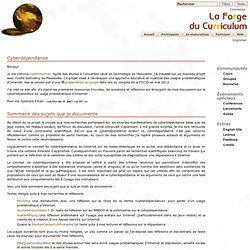
Après des études à l'université Laval en technologie de l'éducation j'ai travaillé sur un nouveau projet avec l'Unité Domrémy de Plessisville. Ce projet visait à développer une approche éducative et nuancée des usages problématiques d'Internet. Voir la version pdf d'une présentation du projet faite lors du congrès de la FCCID en mai 2012. J'ai créé ce wiki afin d'y placer les premières ressources trouvées, les questions et réflexions qui émergent de mes discussions sur la cyberdépendance ou usage problématique d'Internet. Pour me rejoindre Email: <judithhorman AT gmail.com DOT ca> Sommaire des sujets que je documente Au début de ce projet je croyais que mes recherches porteraient sur les diverses manifestations de cyberdépendance telles que les jeux vidéos, les réseaux sociaux, les forum de discussion, l'achat compulsif. Voici une liste sommaire des sujets que je suis en train de documenter : Nos pages Wiki personnelles CyberDependance.
Online Library: Search Results Page. Cyberpsychology, Behavior, and Social Networking. Editor-in-Chief: Brenda K.
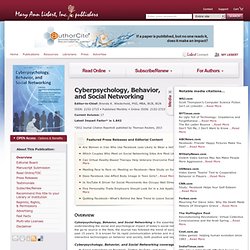
Wiederhold, PhD, MBA, BCB, BCN Latest Impact Factor* is 1.842 *2012 Journal Citation Reports® published by Thomson Reuters, 2013 Overview Cyberpsychology, Behavior, and Social Networking is the essential, peer-reviewed journal for understanding the social and psychological impact of today’s social networking practices. Highly regarded as the go-to source in the field, the Journal has followed the trend of social networking and virtual reality for the past 15 years. PSYCHOLOGY OF COMPUTER USE: XLVII. PARAMETERS OF INTERNET USE, ABUSE AND ADDICTION: THE FIRST 90 DAYS OF THE INTERNET USAGE SURVEY. Internet Addiction: The Emergence of a New Clinical Disorder. To cite this article:KIMBERLY S.
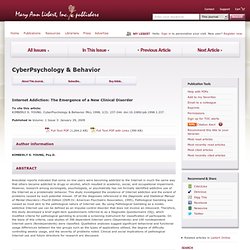
YOUNG. CyberPsychology & Behavior. FALL 1998, 1(3): 237-244. doi:10.1089/cpb.1998.1.237. This paper was cited by: Internet and Computer Addiction: Signs, Symptoms, and Treatment. ReSTART Internet Addiction Recovery Program. Psych Central: Search Results. Maressa Orzack. Dr.
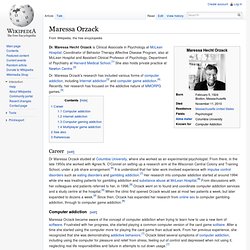
Maressa Hecht Orzack is Clinical Associate in Psychology at McLean Hospital; Coordinator of Behavior Therapy Affective Disease Program, also at McLean Hospital and Assistant Clinical Professor of Psychology, Department of Psychiatry at Harvard Medical School.[1] She also holds private practice at Newton Centre.[2] Dr. Maressa Orzack's research has included various forms of computer addiction, including Internet addiction[3] and computer game addiction.[4] Recently, her research has focused on the addictive nature of MMORPG games.[5] Career[edit] Dr Maressa Orzack studied at Columbia University, where she worked as an experimental psychologist.
Computer addiction[edit] Maressa Orzack became aware of the concept of computer addiction when trying to learn how to use a new item of software. Following from this, Orzack continued her research in this area and contacting other academics in this field. About John M. Grohol, Psy.D. John M. Grohol, Psy.D. is an expert in online mental health services, author, and a leading Internet consultant. He received his graduate training in clinical psychology from Nova Southeastern University and his undergraduate degree from the University of Delaware. A pioneer in psychology online since 1991, Dr. Grohol was founder and Editor-in-Chief of Perspectives: A Mental Health Magazine, and Associate Editor of Behavior OnLine and the bimonthly newsletter PsychNews International. He is also an Associate Editor for the print journal, Journal of Technology in Human Services.
Dr Grohol is on the faculty of the Cape Cod Institute and has appeared on Good Morning America, CNN & Time, The Crier Report, and local broadcasts. Walther_cad.pdf (Objet application/pdf) More Spin on “Internet Addiction Disorder” So you wonder how “Internet Addiction Disorder” is faring these days?
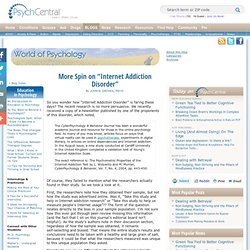
The recent research is no more persuasive. We recently received a copy of a newsletter published by one of the proponents of this disorder, which noted, The CyberPsychology & Behavior Journal has been a wonderful academic journal and resource for those in the online psychology field. As many of you may know, articles focus on ways that virtual reality can be used in psychotherapy, experiments in digital literacy, to articles on online dependencies and Internet addiction.
In the August issue, a new study conducted at Cardiff University in the United Kingdom completed a validation test of Young’s Internet Addiction Scale.The exact reference is: The Psychometric Properties of the Internet Addiction Test by L. Of course, they failed to mention what the researchers actually found in their study. First, the researchers note how they obtained their sample, but not how the study was advertised online. Internet Addiction and Online Addiction. Dialectical Behavior Therapy (DBT) HomeDialectical Behavior Therapy (DBT) Dialectical Behavior Therapy (DBT) is a comprehensive cognitive-behavioral treatment for complex, difficult-to-treat mental health issues.æ It has evolved and been adapted to help people with disorders involving emotion dysregulation, substance dependence, binge eating, depression, mood disorders, and anxiety disorders.æ DBT has been proven successful in a variety of settings, including residential treatment.
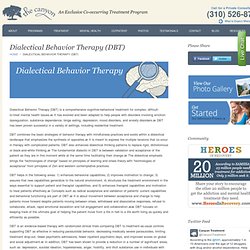
DBT combines the basic strategies of behavior therapy with mindfulness practices and exists within a dialectical landscape that emphasizes the synthesis of opposites.æ It is meant to express the multiple tensions that co-occur in therapy with complicated patients. Kelly M Seidlitz, MS, CDP is the Program Director of The Canyon and facilitates three DBT skills groups each week at The Canyon.æ He completed the 10-day Intensive Training with Dr. Drug Rehab, Alcohol Rehabilitation, Addiction Treatment and Detox - The Canyon Malibu, California. Netaddiction.com. Addiction Measures List > Internet Addiction Scale (Young’s Diagnostic Questionnaire)
Compulsive Surfing. Screen Addiction is an impulsive-control problem that can be divided into various subtypes, each requiring counseling or inpatient treatment:
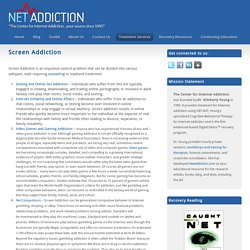
Internet Addiction Test. The Internet Addiction Test emerged as the first validated measure of Internet and technology addiction.
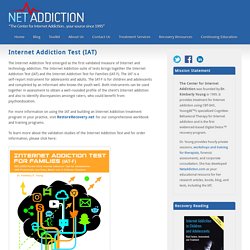
The Internet Addiction suite of tests brings together the Internet Addiction Test (IAT) and the Internet Addiction Test for Families (IAT-F). The IAT is a self-report instrument for adolescents and adults. The IAT-F is for children and adolescents and completed by an informant who knows the youth well. Both instruments can be used together in assessment to obtain a well-rounded profile of the client’s Internet addiction and also to identify discrepancies amongst raters, who could benefit from psychoeducation.